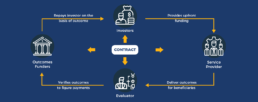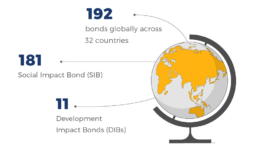“[Impact Bonds] are among the more exciting and potentially promising instruments to recently enter the innovative financing market… This approach transforms a development challenge into an investable opportunity rather [than] a problem.”- World Bank
01
Pay for Success (PFS) model, also known as Impact Bonds, is a results-based contract whereby outcomes funders, service providers, and investors are bound by a common goal—the achievement of outcomes.
02
Risk investors provide upfront capital and support service providers to reach the target outcomes.
03
If the targets are met or exceeded, government (in the case of a Social Impact Bond) or philanthropic donors (in the case of a Development impact bond) pay back the investors their principal plus a return.
04
Independent evaluators measure the success of the program in reaching the target learning outcomes, triggering payments. In general, the more successful the programme, the greater the return to investors, usually up to some cap.

In the decade since the first impact bond was launched in the UK in 2010, the market has grown exponentially. As of April 2020, Brookings Global Impact Bonds Database has identified 192 contracted impact bonds around the world, as well as many more in design.

Social Impact Bonds or Development Impact Bonds should not be confused with Social Bonds, Green Bonds or Sustainability Bonds. SIBs and DIBs are pay-for-success or results-based contracts or arrangement.
Social Bond
01
Green Bond
02
Sustainability Bond
03
